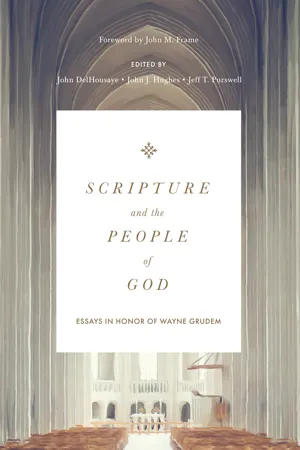
Scripture and the People of God
Essays in Honor of Wayne Grudem
- English
- ePUB (mobile friendly)
- Available on iOS & Android
Scripture and the People of God
Essays in Honor of Wayne Grudem
About this book
Scripture is the foundation for all of Christian life and ministry, but in our current age it is being challenged, doubted, and, in many cases, simply ignored.
Wayne Grudem, one of evangelicalism's best-known theologians and authors, has worked tirelessly throughout his life to demonstrate the necessity, sufficiency, and centrality of Scripture.
In his honor, Grudem's friends and colleagues, including John Piper, Thomas R. Schreiner, Sam Storms, Vern S. Poythress, John M. Frame, Gregg R. Allison, Erik Thoennes, and John DelHousaye, have compiled a series of essays on various topics central to Grudem's life and teaching. Exploring topics such as the nature of Scripture, the relationship between Scripture and doctrine, and the role of Scripture in life and ministry, this volume stands as a testimony to the enduring worth of God's Word.
Frequently asked questions
- Essential is ideal for learners and professionals who enjoy exploring a wide range of subjects. Access the Essential Library with 800,000+ trusted titles and best-sellers across business, personal growth, and the humanities. Includes unlimited reading time and Standard Read Aloud voice.
- Complete: Perfect for advanced learners and researchers needing full, unrestricted access. Unlock 1.4M+ books across hundreds of subjects, including academic and specialized titles. The Complete Plan also includes advanced features like Premium Read Aloud and Research Assistant.
Please note we cannot support devices running on iOS 13 and Android 7 or earlier. Learn more about using the app.
Information

Table of contents
- Cover
- Newsletter Signup
- Title Page
- Copyright
- Contents
- Tribute to Wayne Grudem
- Foreword
- Preface
- Acknowledgments
- Abbreviations
- Part 1 Systematic Theology
- 1 The Word of God and the People of God
- 2 Is Scripture’s Self-A ttestation Sufficient?
- 3 Multiple Patterns Reflecting the Trinity and Coinherence in Verbal Communication
- 4 Revelatory Gifts of the Spirit and the Sufficiency of Scripture
- 5 Developing Doctrine from Scripture
- Part 2 Biblical Studies
- 6 Across the Kidron
- 7 The Transforming Power of Christ’s Love
- 8 The Spirit and the Church
- 9 Translating God’s Words
- 10 Much Ado about Headship
- 11 The Value of Literal Bible Translation
- Part 3 Pastoral Ministry
- 12 Thoughts on Leadership
- 13 “Not in Vain”
- 14 The Doctrine of Scripture and the Shape of the Sermon
- 15 Patiently Sowing God’s Word in Pastoral Ministry
- 16 The Spirit, the Word, and Revival
- 17 The Glory of God as the Ground of the Mind’s Certainty and the Goal of the Soul’s Satisfaction
- 18 Transgender Identity in Theological and Moral Perspective
- 19 Scripture, the Image of God, and the Sinner
- Appendix Scripture Versions Cited
- Writings of Wayne Grudem
- Contributors
- General Index
- Scripture Index